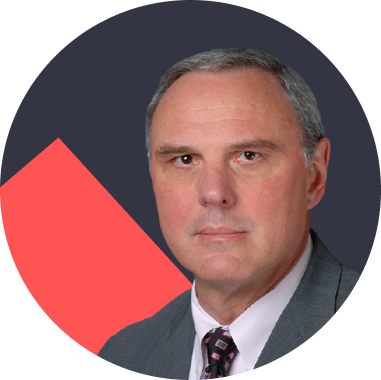The Ability to See Both Sides with
Dr. Richard Kovacs

A Conversation with Dr. Richard Kovacs
“One of the most important traits is the ability to see both sides of a question, both sides of a debate, while sticking up for your intellectual convictions. There is a saying in Indiana – it’s a mighty thin pancake that doesn’t have two sides.”
Bio
Dr. Richard Kovacs is the current President of the American College of Cardiology and the Q.E. and Sally Russell Professor of Cardiology at Indiana University School of Medicine. He trained at Indiana University, where he was the chief medical resident and chief cardiology fellow. He is a clinical cardiology leader for Indiana University Health Physicians where he is responsible for the coordination of patient care activities across all the hospitals served by the IU faculty cardiologists. Dr. Kovac’s research focuses on quality measurement, drug safety, and sports cardiology. Dr. Kovacs was a Co-Chair of the committee that revised the AHA/ACC Eligibility and Disqualification Recommendations for Competitive Athletes with Cardiovascular Abnormalities. As a sports fanatic himself, he oversees the cardiovascular evaluation of players at the Annual NFL Scouting Combine in Indianapolis. There is a saying in Indiana that it’s a mighty thin pancake that doesn’t have two sides.
How do you define success?
“I think success is defined by the assessment of your peers,” Dr. Kovacs began. “I believe that assessing yourself and self-promotion is really secondary. The strongest examples of success are those that come spontaneously from those you work with, from those that you respect and who respect you, and come from outside of yourself. You will be told when you are successful. I don’t think you have to tell yourself that you’re successful.”
The older he gets, the quicker Dr. Kovacs has learned to accept failure. Because success comes from outside of you, he believes it is important to listen closely to others. As we listen, we will receive messages that tell us if our actions are producing our intended results.
Who were your role models early on in life and what were some life lessons that have remained with you over the years?
“My mother was like my father, both veterans of World War II. She served in the Navy in World War II. My father died when I was quite young, and she was a widow with three children. My mother taught me a great deal. I think she was a bit ahead of her time when I was in high school. She used to go off to the Y and do yoga class when she was 19 in the 1960s, when nobody knew what yoga was. She frequented the local farmer’s markets and ate local. She walked to work.”
“I had strong male role models as well, when I was a child. I come from an immigrant community. My ancestors are from Hungary. I’m a second generation American. And we had a very close knit, Hungarian community in the small town where I grew up in Ohio. And we looked out for each other as immigrants are likely to do. So I had strong role models there, but I think my strongest role model growing up was my mom.”
“She taught me humility. So many aspiring academic physicians feel that their future is controlled by those above them, by their superiors and the evaluation of their superiors. I firmly believe that equally important to the evaluation of your superiors is the evaluation of those who you would consider to be below you. To the technicians, to the environmental services people, to the people in the hospital that are delivering meals to the patients. To those, you think that are just there to serve the physicians. I think that your relationships, gaining the respect of the entire team from top to bottom and listening to both those above and what you would consider beneath you in your career are important to your advancement.”
What are some tips for better appreciating those around us?
Dr. Kovacs has a routine he regularly follows at his faculty meetings. He frequently asks those in the room a simple question, “What is one thing you are able to do in your profession completely by yourself?” The answer is always the same. Nothing.
Dr. Kovacs continues, “I can’t think of anything that I do completely by myself.” This reality helps him to live with a sense of gratitude to those above and beneath him on the organizational flow chart. Everyone works together to achieve a common goal.
What would you say to those who struggle to gain value from a mentoring relationship?
“I think those seeking mentorship will often feel I can’t approach professor X or Dr. Y because they’re too high, they’re too lofty, they’re inaccessible. I don’t agree with that. I think that you will find that many of the most successful mentors are the most accessible and seem to have almost limitless capacity for mentoring. And you’ll find that many of the folks in that position are very nice people. They didn’t get to where they are by being a jerk. There may be some notable exceptions to the rule, but by and large, I think these people are very approachable. And so, put your fear aside, approach them, respect their time, but don’t be afraid. If they say, well, I simply don’t have time for you. Okay. Move on. But I don’t think you should feel like people are truly inaccessible.”
What are the traits and habits of the most successful students and residents you’ve come across?
“I think there’s probably three. One is from Sir Francis Bacon. And this was chiseled into the wall at the library at the University of Chicago. And it is, ‘Read not to contradict and confute; nor to believe and take for granted; nor to find talk and discourse; but to weigh and consider.’”
“The second was from the television newscaster Walter Cronkite. His opposition to the Vietnam War probably turned the tide of U.S. involvement in Vietnam, but he had a sidekick, a commentator whose name was Eric Sevareid. At that time there were newspapers and Eric Sevareid in his farewell broadcast commentary said any person who doesn’t read two newspapers a day is a fool. Again, both sides.”
“And then finally there’s a saying in Indiana that it’s a mighty thin pancake that doesn’t have two sides. So I think that ability to see both sides of a debate, all the while sticking up for your intellectual convictions is a very important characteristic that I look for in young people.”
Pearls of Wisdom
- Always remember that you are part of a team. Ask yourself – is there anything that I can do completely by myself in the hospital?
- Successful mentors are accessible, in fact they have a limitless capacity for mentoring. Never have second thoughts when approaching a mentor and asking for advice.
- Be humble. Do not get caught up in personal accolades and accomplishments. Stay grounded in who you are and where you came from.
